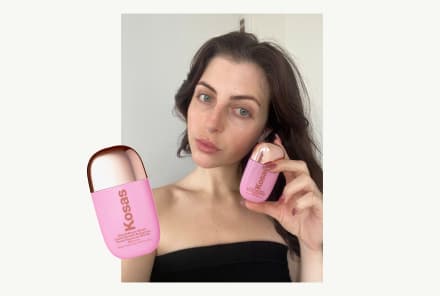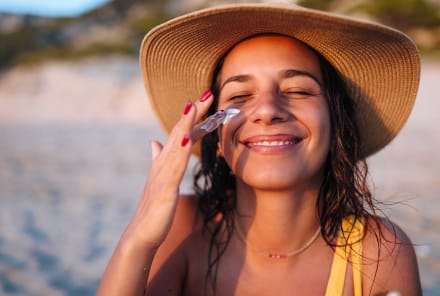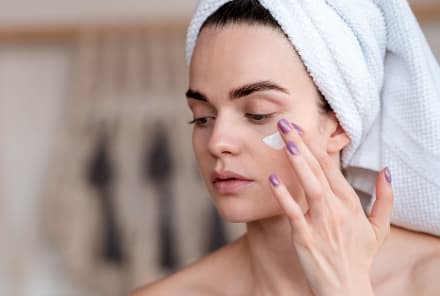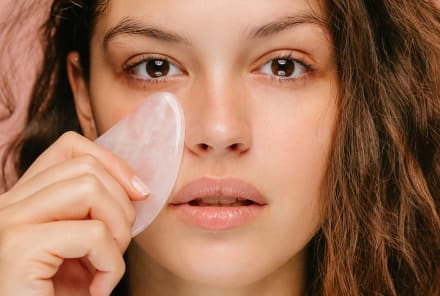Advertisement
What's The Deal With Retinol Body Lotions? Your Guide To The Trendy Product


More and more I'm seeing a very familiar ingredient grace the label of body lotions: Retinol has wiggled its way into the personal care category. The skin care active has seen its fair share of fanfare as an ingredient in serums and night creams for decades, as it can help with aging skin and acne alike.
But it's also an addition that comes with a healthy dose of usage tips and cautions—the ingredient isn't for all skin types and definitely has an adjustment period for most people. This all raises the question: What do you need to know about using retinol-spiked body creams? Well, here's a helpful mini-guide.
What is retinol & should you be using it in your body lotion?
Retinol refers to a compound derived from vitamin A and is available over the counter (OTC) at low strengths. (Retinol falls under the umbrella term "retinoids," which includes all vitamin A derivatives—both OTC and prescription.) It has several key benefits that dermatologists note. For starters, it can encourage collagen production. "Retinol binds to retinoid receptors within skin cells," says board-certified dermatologist Joshua Zeichner, M.D., about retinol in our guide to the ingredient. This "activates genes that upregulate collagen production."
It also stimulates cell turnover, making the appearance of the skin brighter and more youthful: "Besides stimulating production of new collagen, retinol enhances cell turnover," says Zeichner. "This means it sheds dead and damaged cells that make the skin look dull." And while retinol thickens the lower layers of the skin (a good thing), it thins out the top layer, which creates a dewy, clear-skin glow, he says.
These benefits are the same if applied north or south of the jawline. So a retinol body lotion may be enticing for those dealing with body acne, rougher overall texture, or signs of aging, such as crepey quality, sagging skin, or dark spots.
However, retinol does come with warnings. Notably, those with sensitive or reactive skin find it difficult to tolerate—if they're even able to use it at all. So much like we give the advice to proceed with caution on the face, we encourage the same with this body care category. If you begin to experience inflammation flare-ups and extreme dryness that goes on for weeks without getting better, it may be an indication that it's just not the ingredient for you. And that's OK! There are plenty of healthy aging ingredients on the market that will help your skin look soft and supple—like coenzyme Q10, aloe vera, botanical oils, and targeted-biotic ingredients—that are also appropriate for sensitive skin.
Finally, there's another group of individuals who will not be able to use retinol body lotions. In general, many derms agree that you should not use retinol if you are pregnant or breastfeeding. While the primary concern is ingesting oral retinoids, doctors and derms recommend ceasing topical use as well1—as a precaution since we don't yet know how much is absorbed into the bloodstream, especially when using it on a large surface area.
How to use a retinol body lotion—if you choose to.
For starters, never use your face option on the body: That'd be ridiculously expensive and likely too high of a concentration. So if you'd like to use a retinol on the body, you really do need to find an area-specific option.
However, from there, many of the same skin care rules apply:
Start by only using it two or three times a week, working your way up if you can.
"Just be aware that it is always best to start slowly," says board-certified dermatologist Loretta Ciraldo, M.D., FAAD, in this retinol dossier. "Consider applying the product sparingly—only Monday, Wednesday, Friday—for the first two to three weeks. If no redness, peeling, or irritation develops, you can increase frequency" Some people may find that they will be happy with the results at this level, while others will opt for more frequent usage, and still others will find that it's not for them at all.
Only apply at night & never skip SPF during the day.
Retinol makes your skin photosensitive, increasing the likelihood of burns and damage. You should never—we repeat, never—apply retinol on the skin and then step out to the sun unprotected. As is the case with any retinol use, you will need to prioritize sunscreen and safe sun practices even more than you already do.
Hydrate on your “off" days.
If you choose to use a retinol body lotion, you'll need a second one in your lineup to reach for on the days you're skipping the active. Opt for extra-hydrating and repairing options to account for any increased dryness and irritation. "It's like when you go to the gym, you need days to recover. The same thing holds true for the skin barrier and the microbiome," says board-certified dermatologist Whitney Bowe, M.D., on the mindbodygreen podcast. "You want to use a retinol? Go for it, but give yourself two nights off when you're just using nourishing, hydrating ingredients."
Use two lotions at the same time.
You can even use them together: You may find that you want to use a hydrating number in addition to your retinol lotion to buffer any unwanted effects and optimize your skin's appearance.
Spot-treat areas, instead of going all over.
Perhaps it's just the chest and neck that are giving you pause–well, then you can feel free to only use the lotion in those areas and then use your hydration elsewhere. Or if you're experiencing acne on your back and shoulders, just tend to those locations. You don't need to apply it everywhere if you don't need to.
The takeaway.
Retinol body lotions may be trendy right now—as retinol is (often, rightfully) hailed as a super active. However, they're not right for everyone and you should proceed with caution when folding it into your personal care practice: Only use the product a few days a week, buffer with other hydrating body lotions, and practice safe sun exposure. And if your skin can't deal with it at all? That's OK too—here are some of our other favorite body lotions to try instead.
Watch Next
Enjoy some of our favorite clips from classes
Enjoy some of our favorite clips from classes
What Is Meditation?
Mindfulness/Spirituality | Light Watkins
Box Breathing
Mindfulness/Spirituality | Gwen Dittmar
What Breathwork Can Address
Mindfulness/Spirituality | Gwen Dittmar
The 8 Limbs of Yoga - What is Asana?
Yoga | Caley Alyssa
Two Standing Postures to Open Up Tight Hips
Yoga | Caley Alyssa
How Plants Can Optimize Athletic Performance
Nutrition | Rich Roll
What to Eat Before a Workout
Nutrition | Rich Roll
How Ayurveda Helps Us Navigate Modern Life
Nutrition | Sahara Rose
Messages About Love & Relationships
Love & Relationships | Esther Perel
Love Languages
Love & Relationships | Esther Perel
-v1646695196476.jpg?1148x800)

















